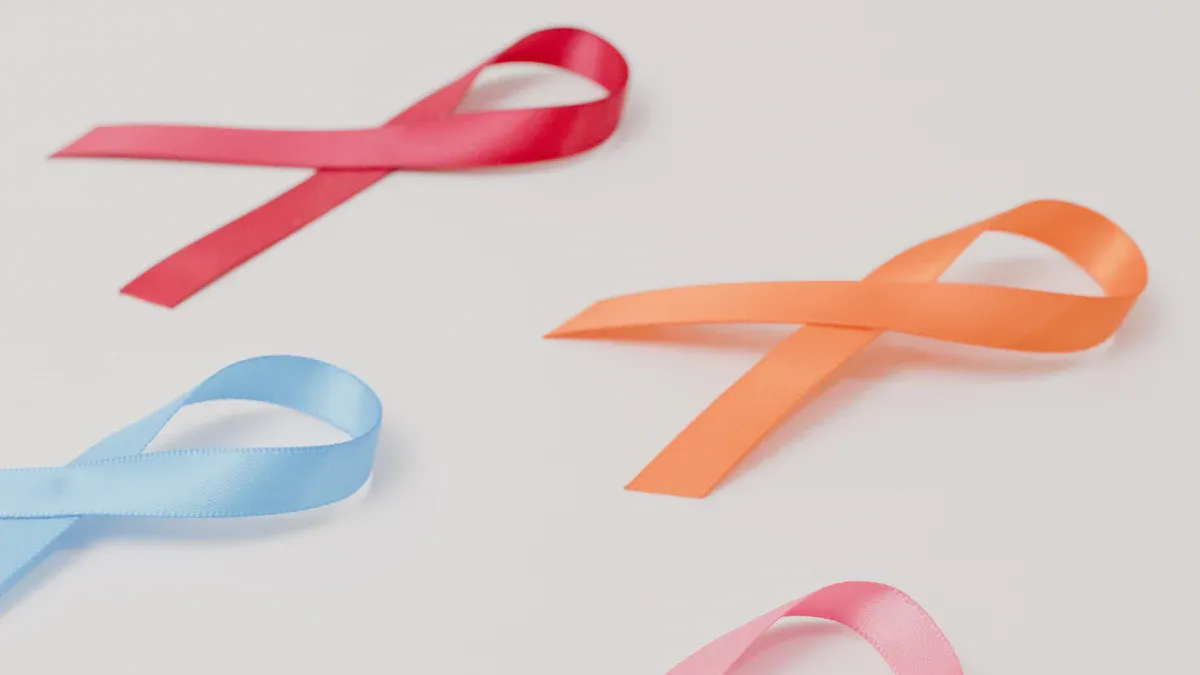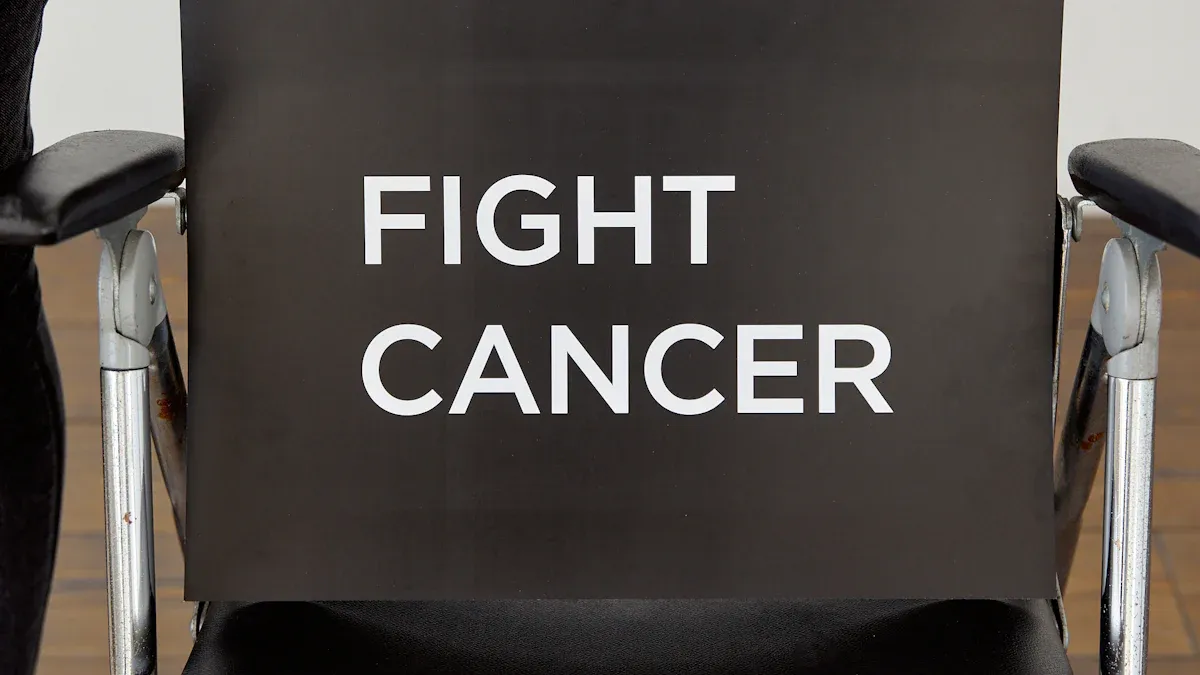What Are the Types of Cancers Linked to AIDS

When HIV weakens your immune system, it becomes harder for your body to fight off infections and abnormal cell growth. This makes you more vulnerable to AIDS related cancers, which include both AIDS-defining cancers and others that occur more frequently in people with HIV. Recognizing the symptoms early can help you seek timely treatment.
Here’s a quick look at some common symptoms of these cancers:
Cancer Type | Common Symptoms |
|---|---|
Kaposi sarcoma | Purple or brown spots on skin, fever, cough, swollen lymph nodes, stomach pain, weight loss. |
Non-Hodgkin and Hodgkin lymphoma | Fever, unexplained weight loss, night sweats, swollen lymph nodes, chest fullness, memory loss, confusion, fatigue. |
Cervical cancer | Abnormal vaginal bleeding, pain during sex, longer or heavier periods. |
Anal cancer | Pain, bleeding, itching, lump in anal area, change in bowel habits. |
Lung cancer | Shortness of breath, severe coughing, chest pain, hoarse voice, fatigue, weight loss. |
Understanding these symptoms can help you take control of your health and discuss concerns with your doctor.
Key Takeaways
HIV makes the immune system weaker, raising the chance of cancers linked to AIDS. Finding symptoms early helps get treatment on time.
Common signs of these cancers are losing weight, swollen lymph nodes, and a cough that won’t go away. Knowing these signs is very important.
Getting regular check-ups and vaccines for HPV and hepatitis B can greatly reduce the chance of getting some cancers.
Staying healthy by eating good food, exercising often, and not smoking can make your immune system stronger and lower cancer risk.
Taking antiretroviral therapy (ART) is key to controlling HIV. It also helps lower the chance of AIDS-related cancers by boosting the immune system.
AIDS-Defining Cancers

Kaposi's Sarcoma
Kaposi's sarcoma (KS) is one of the most common AIDS-related cancers. It often appears as purple or brown spots on your skin but can also affect internal organs like your lungs or digestive system. This cancer is caused by the Kaposi sarcoma-associated herpesvirus (KSHV). In 2020, over 34,000 cases of KS were reported globally, with approximately 80% of these cases occurring in sub-Saharan Africa due to the high prevalence of HIV in the region. If you have HIV, your risk of developing KS is significantly higher—about 500 times more than someone without HIV. Early detection and treatment, such as antiretroviral therapy, can help manage this condition effectively.
Non-Hodgkin's Lymphoma
Non-Hodgkin's lymphoma (NHL) is another AIDS-defining cancer that occurs more frequently in people with HIV. This cancer affects your lymphatic system, which is a crucial part of your immune defense. Types of NHL linked to HIV include primary central nervous system lymphoma, Burkitt lymphoma, and diffuse large B-cell lymphoma. HIV weakens your immune system, making it harder for your body to fight off abnormal cell growth, which increases your risk of NHL. Symptoms like swollen lymph nodes, fever, and night sweats should prompt you to seek medical advice. Early treatment, including chemotherapy and antiretroviral therapy, can improve outcomes.
Invasive Cervical Cancer
Invasive cervical cancer is a significant concern for women living with HIV. This cancer develops in the cervix and is often linked to persistent infection with the human papillomavirus (HPV). Women with HIV are about three times more likely to develop cervical cancer compared to those without HIV. Regular screening, such as Pap smears, can help detect precancerous changes early. Vaccination against HPV is another effective preventive measure. If you notice symptoms like abnormal vaginal bleeding or pain during intercourse, consult your doctor immediately. Early intervention can make a significant difference in managing this cancer.
Other AIDS Related Cancers with Increased Prevalence
Anal Cancer
Anal cancer occurs more frequently in individuals with HIV. This cancer develops in the tissues of the anal canal and is often linked to persistent infection with the human papillomavirus (HPV). If you have HIV, your risk of developing anal cancer is significantly higher than the general population.
You are 19 times more likely to be diagnosed with anal cancer compared to someone without HIV.
Symptoms of anal cancer include pain, bleeding, itching, or a lump in the anal area. Changes in bowel habits may also occur. Early detection through regular screenings can improve outcomes. Vaccination against HPV is a preventive measure that can lower your risk.
Liver Cancer
Liver cancer is another cancer with increased prevalence in people living with HIV. Chronic infections with hepatitis B or hepatitis C viruses often contribute to this risk. These infections are more common in HIV-positive individuals, which increases the likelihood of liver damage and cancer.
Symptoms of liver cancer may include abdominal pain, swelling, jaundice (yellowing of the skin and eyes), and unexplained weight loss. If you have HIV, managing co-infections and maintaining liver health through regular check-ups is essential. Antiviral treatments for hepatitis B and C can help reduce your risk of liver cancer.
Lung Cancer
Lung cancer is one of the most common cancers worldwide, and its prevalence is higher in individuals with HIV. Smoking remains a significant risk factor, but HIV itself also plays a role.
If you are HIV-positive, you are twice as likely to develop lung cancer compared to the general population.
Symptoms of lung cancer include persistent coughing, shortness of breath, chest pain, and unexplained fatigue. Regular screenings and quitting smoking can help lower your risk. Maintaining a healthy lifestyle and adhering to antiretroviral therapy can also support your overall health.
Hodgkin's Lymphoma
Hodgkin's lymphoma is a type of cancer that affects your lymphatic system, which plays a vital role in your immune defense. If you have HIV, your risk of developing Hodgkin's lymphoma increases compared to someone without HIV. This is because HIV weakens your immune system, making it harder for your body to fight off abnormal cell growth.
You might notice symptoms such as:
Swollen lymph nodes in your neck, armpits, or groin.
Persistent fatigue that doesn’t improve with rest.
Fever and night sweats.
Unexplained weight loss or loss of appetite.
These symptoms can overlap with other illnesses, so it’s important to consult your doctor if you experience them.
Hodgkin's lymphoma is often linked to the Epstein-Barr virus (EBV), which is more common in people with HIV. The weakened immune system allows EBV to trigger abnormal cell growth, leading to cancer. Regular monitoring of your health can help detect this condition early.
Tip: Early diagnosis improves treatment outcomes. If you notice persistent symptoms, don’t delay seeking medical advice.
Treatment for Hodgkin's lymphoma usually involves chemotherapy, radiation therapy, or a combination of both. If you’re on antiretroviral therapy (ART) for HIV, continuing your treatment is crucial. ART helps strengthen your immune system, which can improve your body’s response to cancer treatments.
By staying proactive about your health and following your doctor’s recommendations, you can manage Hodgkin's lymphoma effectively. Regular check-ups and a healthy lifestyle can also reduce your risk of complications.
How HIV Increases the Risk of AIDS Related Cancers
Immune Suppression and Cancer Development
HIV weakens your immune system, making it harder for your body to fight off infections and abnormal cell growth. This immune suppression increases your risk of developing AIDS related cancers. When your immune system is compromised, it cannot effectively detect and destroy cancerous cells.
HIV-related immunosuppression leads to chronic inflammation, which can damage tissues and promote cancer growth.
A weakened immune system also allows viruses like HPV and Epstein-Barr virus to thrive, further increasing cancer risk.
Lifestyle factors, such as smoking or heavy alcohol use, are more common in people with HIV and contribute to cancer development.
By managing your immune health with antiretroviral therapy, you can reduce these risks and improve your overall well-being.
Co-Infections and Their Role in Cancer Risk
HIV-positive individuals often face co-infections that increase cancer risk. These infections can trigger abnormal cell growth or weaken your immune system further. Some of the most common co-infections include:
Kaposi sarcoma-associated herpesvirus (KSHV)
Epstein-Barr virus (EBV)
Human papillomavirus (HPV)
Hepatitis B virus (HBV)
Hepatitis C virus (HCV)
For example, HPV can lead to cervical or anal cancer, while HBV and HCV increase the risk of liver cancer. Regular screenings and vaccinations can help you manage these risks effectively.
Chronic Inflammation and Its Impact on Cancer
Chronic inflammation caused by HIV plays a significant role in cancer development. Inflammation occurs when your body tries to fight off infections or repair damaged tissues. However, long-term inflammation can harm healthy cells and create an environment where cancer thrives.
You may experience inflammation due to untreated HIV, co-infections, or lifestyle factors like smoking. This inflammation can lead to DNA damage, which increases the likelihood of cancer. By adhering to antiretroviral therapy and maintaining a healthy lifestyle, you can reduce inflammation and lower your cancer risk.
Treatment Options for AIDS Related Cancers
Role of HAART (Highly Active Antiretroviral Therapy)
HAART plays a crucial role in managing AIDS related cancers by strengthening your immune system. This therapy reduces the viral load in your body, allowing your immune system to recover and fight off infections and abnormal cell growth. Since the introduction of HAART, the incidence of Kaposi's sarcoma has dropped by about two-thirds. For non-Hodgkin's lymphoma, HAART has shown mixed results, with studies indicating a 42% decrease in risk. Although data on central nervous system lymphomas is limited, recent findings suggest a significant reduction in risk. By adhering to HAART, you can lower your chances of developing these cancers and improve your overall health.
Chemotherapy and Radiation Therapy
Chemotherapy and radiation therapy are common treatments for many cancers, including those linked to HIV. Chemotherapy uses drugs to destroy cancer cells, while radiation therapy targets cancerous tissues with high-energy rays. If you are undergoing these treatments, your doctor will carefully monitor your immune system to minimize side effects. Combining these therapies with HAART can improve your outcomes. For example, early cancer treatment in HIV-positive individuals has been shown to reduce the risk of AIDS-defining cancers by 64% and virus-related cancers by 59%. These therapies, when used alongside HAART, can help you manage cancer effectively.
Targeted Therapies and Immunotherapy
Targeted therapies and immunotherapy offer newer, more precise options for treating cancer. Targeted therapies focus on specific molecules involved in cancer growth, while immunotherapy boosts your immune system to fight cancer. These treatments are particularly beneficial if traditional methods like chemotherapy are not suitable for you. Advances in these therapies have made it possible to treat certain cancers with fewer side effects. If you are living with HIV, your doctor may recommend these options based on your specific cancer type and overall health. Staying proactive about your treatment can help you achieve better outcomes.
Palliative Care for Advanced Cases
When dealing with advanced AIDS-related cancers, palliative care focuses on improving your quality of life. This type of care addresses symptoms, emotional well-being, and overall comfort rather than curing the disease. If you or a loved one faces advanced cancer, palliative care can provide essential support.
What Palliative Care Includes
Palliative care offers a range of services tailored to your needs:
Pain Management: Medications and therapies help control pain effectively.
Symptom Relief: Treatments target symptoms like nausea, fatigue, or breathing difficulties.
Emotional Support: Counselors and support groups help you cope with stress and anxiety.
Spiritual Care: Chaplains or spiritual advisors can guide you through existential concerns.
Note: Palliative care is not limited to end-of-life situations. You can receive it alongside other treatments to improve your daily life.
Benefits of Palliative Care
Palliative care helps you maintain dignity and comfort during challenging times. It also supports your family by offering guidance and resources. Studies show that patients receiving palliative care often experience less pain and better emotional health.
How to Access Palliative Care
You can discuss palliative care options with your healthcare provider. Many hospitals and clinics have specialized teams trained in this field. If you prefer home-based care, organizations like hospice services can assist you.
By focusing on your comfort and well-being, palliative care ensures you live as fully as possible. It empowers you to make decisions about your care and provides the support you need to navigate this journey.
Prevention and Early Detection of AIDS Related Cancers

Regular Screening and Early Diagnosis
Regular screening plays a vital role in catching cancer early. If you live with HIV, you should prioritize routine check-ups to monitor your health. Tests like Pap smears for cervical cancer or anal cytology for anal cancer can detect abnormal changes before they become serious. Early diagnosis improves your chances of successful treatment and better outcomes.
Tip: Talk to your doctor about the right screening schedule for you. They can recommend tests based on your age, gender, and risk factors.
By staying proactive, you can take control of your health and reduce the impact of AIDS related cancers.
Vaccination Against HPV and Hepatitis B
Vaccines offer powerful protection against certain cancers. The HPV vaccine helps prevent cervical, anal, and other cancers linked to the human papillomavirus. If you haven’t received this vaccine, ask your healthcare provider about it. The hepatitis B vaccine is equally important. It reduces your risk of liver cancer by protecting you from the hepatitis B virus, which is more common in people with HIV.
Note: Vaccination works best when given early, but it’s never too late to protect yourself.
By getting vaccinated, you can lower your risk of developing these preventable cancers.
Maintaining Immune Health with HAART
Your immune system is your first line of defense against cancer. Highly Active Antiretroviral Therapy (HAART) helps keep your immune system strong by controlling HIV. When your immune system functions well, it can fight off infections and abnormal cell growth more effectively.
To maintain your immune health, take your medications as prescribed. Missing doses can weaken your immune system and increase your risk of complications. Pair HAART with a healthy lifestyle, including a balanced diet and regular exercise, to further support your body’s defenses.
Reminder: Consistency is key. Sticking to your treatment plan helps you stay healthier and reduces your risk of cancer.
Lifestyle Changes to Lower Cancer Risk
Adopting healthy lifestyle habits can significantly lower your risk of developing AIDS-related cancers. These changes not only improve your overall health but also strengthen your immune system, helping your body fight off infections and abnormal cell growth.
1. Quit Smoking 🚭
Smoking increases your risk of lung cancer and other cancers. If you smoke, quitting is one of the best steps you can take for your health.
Seek support from smoking cessation programs or counseling.
Use nicotine replacement therapies or medications if needed.
Tip: Apps and support groups can help you stay motivated during your journey to quit smoking.
2. Eat a Balanced Diet 🥗
A nutritious diet supports your immune system and reduces inflammation. Focus on eating:
Fresh fruits and vegetables.
Whole grains like brown rice or oats.
Lean proteins such as chicken, fish, or beans.
Avoid processed foods, sugary drinks, and excessive alcohol. These can weaken your immune system and increase cancer risk.
3. Stay Physically Active 🏃♂️
Regular exercise helps maintain a healthy weight and reduces inflammation. Aim for at least 30 minutes of moderate activity, like walking or cycling, most days of the week. Physical activity also boosts your mood and energy levels.
4. Limit Alcohol Consumption 🍷
Excessive alcohol use can damage your liver and increase your risk of liver cancer. If you drink, do so in moderation. For men, this means no more than two drinks per day. For women, stick to one drink per day.
5. Manage Stress Effectively 🧘♀️
Chronic stress weakens your immune system and may contribute to inflammation. Practice relaxation techniques like meditation, deep breathing, or yoga. These activities can help you stay calm and focused.
Reminder: Small changes can make a big difference. Start with one habit and build from there. Your health is worth the effort.
By making these lifestyle changes, you can take control of your health and reduce your risk of AIDS-related cancers. Stay proactive and consult your healthcare provider for personalized advice.
AIDS related cancers remain a critical health issue due to the immune system's vulnerability caused by HIV. Early detection and timely treatment can significantly improve your health outcomes. Preventive measures, like regular screenings and vaccinations, empower you to take control of your well-being. Always consult your healthcare provider for personalized advice tailored to your needs. Accessing reliable resources and staying informed ensures you make the best decisions for your health.
Remember: Proactive care and awareness can make a significant difference in managing your health effectively.
FAQ
What are AIDS-defining cancers?
AIDS-defining cancers include Kaposi's sarcoma, non-Hodgkin's lymphoma, and invasive cervical cancer. These cancers occur more frequently in people with HIV due to immune system suppression. Recognizing symptoms early and starting treatment can improve outcomes.
Can antiretroviral therapy (ART) reduce cancer risk?
Yes, ART strengthens your immune system by controlling HIV. A stronger immune system helps your body fight infections and abnormal cell growth, reducing the risk of AIDS-related cancers. Staying consistent with ART is essential for long-term health.
How can you prevent AIDS-related cancers?
You can lower your risk by:
Getting vaccinated against HPV and hepatitis B.
Attending regular screenings for early detection.
Maintaining a healthy lifestyle with a balanced diet, exercise, and no smoking.
Tip: Consult your doctor for personalized prevention strategies.
Are AIDS-related cancers treatable?
Yes, many AIDS-related cancers are treatable. Options include chemotherapy, radiation, targeted therapies, and immunotherapy. Combining these treatments with ART improves outcomes. Early diagnosis plays a key role in successful treatment.
Why is early detection important?
Early detection allows doctors to treat cancer before it spreads. Regular screenings help identify abnormal changes early, improving your chances of recovery. Talk to your healthcare provider about the right screening schedule for you.
Reminder: Proactive care saves lives. Don't delay routine check-ups.
---
ℹ️ Explore more: Read our Comprehensive Guide to All Known Cancer Types for symptoms, causes, and treatments.

